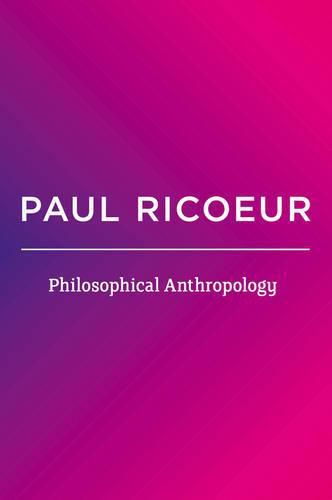Readings Newsletter
Become a Readings Member to make your shopping experience even easier.
Sign in or sign up for free!
You’re not far away from qualifying for FREE standard shipping within Australia
You’ve qualified for FREE standard shipping within Australia
The cart is loading…






How do human beings become human? This question lies behind the so-called Ahuman sciences.A But these disciplines are scattered among many different departments and hold up a cracked mirror to humankind. This is why, in the view of Paul Ricoeur, we need to develop a philosophical anthropology, one that has a much older history but still offers many untapped resources.
This appeal to a specifically philosophical approach to questions regarding what it was to be human did not stop Ricoeur from entering into dialogue with other disciplines and approaches, such as psychoanalysis, history, sociology, anthropology, linguistics and the philosophy of language, in order to offer an up-to-date reflection on what he saw as the fundamental issues. For there is clearly not a simple, single answer to the question Awhat is it to be human?A Ricoeur therefore takes up the complexity of this question in terms of the tensions he sees between the AvoluntaryA and the Ainvoluntary,A AactingA and Asuffering,A AautonomyA and Avulnerability,A AcapacityA and Afragility,A and AidentityA and Aotherness.A
The texts brought together in this volume provide an overall view of the development of RicoeurAs philosophical thinking on the question of what it is to be human, from his early 1939 lecture on AAttentionA to his remarks on receiving the Kluge Prize in 2004, a few months before his death.
$9.00 standard shipping within Australia
FREE standard shipping within Australia for orders over $100.00
Express & International shipping calculated at checkout
How do human beings become human? This question lies behind the so-called Ahuman sciences.A But these disciplines are scattered among many different departments and hold up a cracked mirror to humankind. This is why, in the view of Paul Ricoeur, we need to develop a philosophical anthropology, one that has a much older history but still offers many untapped resources.
This appeal to a specifically philosophical approach to questions regarding what it was to be human did not stop Ricoeur from entering into dialogue with other disciplines and approaches, such as psychoanalysis, history, sociology, anthropology, linguistics and the philosophy of language, in order to offer an up-to-date reflection on what he saw as the fundamental issues. For there is clearly not a simple, single answer to the question Awhat is it to be human?A Ricoeur therefore takes up the complexity of this question in terms of the tensions he sees between the AvoluntaryA and the Ainvoluntary,A AactingA and Asuffering,A AautonomyA and Avulnerability,A AcapacityA and Afragility,A and AidentityA and Aotherness.A
The texts brought together in this volume provide an overall view of the development of RicoeurAs philosophical thinking on the question of what it is to be human, from his early 1939 lecture on AAttentionA to his remarks on receiving the Kluge Prize in 2004, a few months before his death.